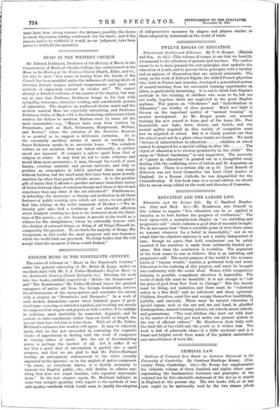MUSIC IN THE WESTERN CHURCH.
devotion, liturgic usages, national temperament, and types and methods of expression current in secular art." We cannot attempt a detailed criticism of the results of his inquiry, but may say at once that Professor Dickinson brings to his task wide sympathy, reverence, extensive reading, and considerable powers of expression. The chapters on mediaeval chorus music and the modern musical Mass are especially interesting, and Professor Dickinson writes of Bach with a discriminating enthusiasm which renders his failure to mention Brahms even by name all the more remarkable,—e.g., " Masses have even been written by Protestants, such as Bach, Schumann, Hauptmann, Richter, and Becker," where the omission of the Deutsches Requiem is so pointed as to suggest a deliberate exclusion. As to the essentially ancillary nature of music in worship Pro- fessor Dickinson speaks in no uncertain tones. "The soundest writers on art maintain that art, taken abstractly, is neither moral nor immoral. It occupies a sphere apart from that of religion or ethics. It may lend its aid to make religious and moral ideas more persuasive ; it may, through the touch of pure beauty, overbear material and prosaic interests, and help to produce an atmosphere in which spiritual ideas may range without friction, but the mind must first have been made morally sensitive by other than purely artistic means. It is the peculiar gift of music that it affords a speedier and more immediate means of fusion between ideas of sensuous beauty and those of devotional experience than any other of the art sisterhood." Furthermore, in defending the insistence on beauty and perfection in all those features of public worship into which art enters, we are glad to find him .relying on the noble argument of Hooker :—" We do thereby give unto God a testimony of our cheerful affection which thinketh nothing too dear to be bestowed about the furni- ture of His service ; as also because it serveth to the world as a witness for His almightiness, whom we outwardly honour with the chiefest of outward things, as being of all things Himself in- comparably the greatest. To set forth the majesty of Kings, His vicegerents in this world, the most gorgeous and rare treasures which the world bath are procured. We think belike that He will accept what the meanest of them would disdain."






















































 Previous page
Previous page